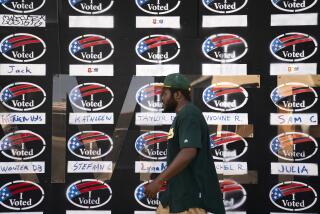Iraqis Get Ready for the Worst
- Share via
BAGHDAD — As fast as butcher Shakir Salman can hang the skinned, headless sheep from hooks in his shop, customers scurry away with armloads of fresh meat.
Homemaker Manar Shumari is frantically stocking up on diapers for her 2-year-old. “I bought some yesterday, but I came again today, just to be sure,” she said.
At Medical City in Baghdad, doctors are dragging mattresses into their offices and bunking in vacant nursing-home beds, preparing for the possibility of widespread bloodshed.
Amid excitement and fear over Sunday’s election, Iraqis are in a mad rush to prepare for an unprecedented three-day national lockdown. With insurgents vowing to disrupt the balloting and kill voters, U.S. and Iraqi security forces have imposed a lengthy set of emergency security measures.
Starting Saturday, borders will be sealed and the airport will be shut down. Government offices and most companies will take a three-day holiday. Nightly curfews begin at 7 p.m. and last until 6 a.m.
In addition, cars will be banned from roads unless occupants have special election badges, except in cases of medical emergency.
Traffic in Baghdad, a city that loves cars as much as Los Angeles does, appeared Thursday to be down by about half. Road closures and police checkpoints made navigating the capital difficult. Many drivers said they wouldn’t risk taking to the roads, noting that insurgents had threatened to attack anyone attempting to vote or assisting in the election.
“I’m staying home,” said Ali Mohammed, 40, a government employee who was filling plastic jerrycans with black-market gas. “We don’t know what’s going to happen.”
Though he won’t be driving, but Mohammed said he needed the fuel to run a generator to compensate for chronic electricity failures.
Demand for gas, food and emergency supplies has spurred a price surge. Black-market prices for gasoline doubled from $1.30 a gallon last week to $2.70 a gallon Thursday. Potatoes that sold for 22 cents for a little more than two pounds on Monday sold for 55 cents Thursday.
Long lines snaked out of bakeries selling samoun, a popular bread. Grocery stores were selling out of water, eggs, canned food and rice.
Iraqis, who over the last two decades have grown accustomed to hunkering down, are preparing for the worst.
“Many people are scared,” said Ahmed Abdullah, 36, a taxi driver who charged double his usual fare this week. “But so what? For one reason or another, we’ve been scared all our lives.”
Similar stockpiling occurred shortly before the U.S.-led invasion in March 2003. But widespread road closures are rare in Iraq, the last one occurring in 1997 during a one-day national census.
Anticipating a rush this week, Salman, who has owned his Baghdad butcher shop since 1962, packed his freezer with lamb chops, steaks and whole chickens. For those customers seeking fresh meat over the weekend, there’s a fluffy, white specimen tethered to a post outside his shop, ready for slaughter.
“I’m going to try to open, but I don’t know if many people will be out shopping,” Salman said.
Preparing Iraq’s hospitals and healthcare facilities poses a unique challenge. If violence is stepped up during the election, the need for doctors and nurses will soar. But the logistics of transporting staff to work amid the security lockdown will be difficult, officials said.
Health Ministry officials ordered the nation’s hospitals on emergency alert beginning Saturday and told them to prepare by stockpiling oxygen, blood, water, gasoline and cash.
“We’re prepared for all eventualities,” said Dr. Amer Mukh- tar, general director of Medical City, a giant complex of teaching hospitals and medical facilities in Baghdad. “God knows what will happen.”
More than 500 elective surgeries were postponed to keep hospital beds free. Nearly 1,000 employees, from surgeons to blood bank workers, will camp out at the facility rather than commute each day. As medical personnel, they are exempted from the travel ban, but most prefer to sleep at work for the three-day lockdown.
Hospital officials had to scramble to find beds and supplies for employees. A nearby restaurant is standing by to help prepare 3,000 extra meals a day, Mukhtar said.
Some doctors are eager to pitch in.
“I believe it’s our duty as doctors to be there when our patients need us,” said Dr. Mustafa Rida, a Baghdad dentist. He was told his skills probably wouldn’t be needed, but he lives near a public heath center and is planning to walk there to assist in any way he can.
Other doctors plan on staying home, saying it’s too risky to be outside.
“I won’t go to the hospital during the election,” said Dr. Talib Mustafa Jawad, a plastic surgeon at Al Kindi Hospital. Jawad said he wanted to vote but then intended to stay home to take care of his mother.
“The risk is too big, especially during elections when there will be no security,” he said. “I’ll stay home. I don’t care what they do to me.”
Even after the balloting is over, medical professionals predict, the national lockdown could have a lasting health effect on Iraq: an election-related baby boom in about nine months.
With citizens banned from the roads, shut in by the curfew and with spotty electricity making it difficult to watch TV or read, Iraqis may search for other methods to occupy their time.
“It will be interesting to see,” Mukhtar said with a smile.
*
Times special correspondent Caesar Ahmed contributed to this report.
More to Read
Sign up for Essential California
The most important California stories and recommendations in your inbox every morning.
You may occasionally receive promotional content from the Los Angeles Times.













